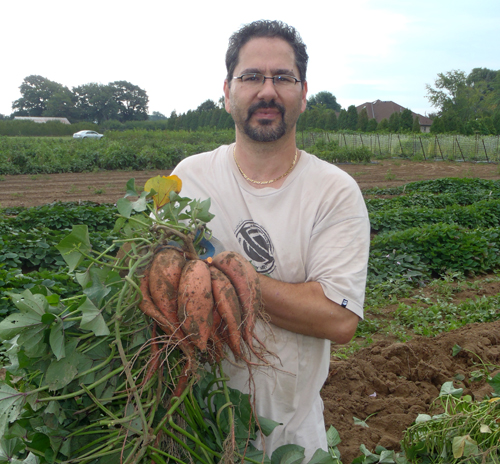By Alaina Osborne, Students Promoting Awareness of Research Knowledge (SPARK)

Canadians love their sweet potatoes — in fact, we import $42 million worth of sweet potatoes from the United States every year. Canadian growers could have a bigger share of the market if there was a variety of the nutrition-packed veggie that was tough enough to thrive in cooler and shorter growing seasons.
Researchers at the Vineland Research and Innovation Centre and the University of Guelph are looking to develop new sweet potato varieties that are better adapted to Canadian environments to reduce imports and increase local acreage.
Vineland research scientist Valerio Primomo and his team are working on sweet potatoes that can be grown and harvested earlier than Ontario’s most popular commercial varieties, Beauregard and Covington, which are grown on about 1,300 acres in the province.
They’re testing various sweet potato seedlings provided by Louisiana State University. After planting the seedlings in a greenhouse, they take slips (cuttings from the mother plant) and transfer them to a field. This way, they can see how the plants react to an Ontario environment.
Since testing began last year, more than 1,000 genetically diverse plants have been screened. From this group, approximately 200 lines will be selected. Each year, researchers will narrow down the number of lines until the most suitable sweet potato candidates remain.
Before they can be planted, sweet potatoes must be able to survive the cooler temperatures and frost typically found in Ontario in early spring. In addition, Ontario has a comparatively short growing season, which means the plants don’t have several months of warm weather to develop, unlike their tropical counterparts.
To fit this shorter schedule, researchers look for seedlings that can be planted in early May and mature quickly near the end of August.
This depends on consumer acceptance of the new varieties. Within the next few years, researchers will begin conducting public surveys to determine consumer preferences, such as taste, shape and colour.
“These are important factors when purchasing any vegetable,” says Primomo.
Researchers already know that the public enjoys sweet potatoes in two basic forms: baked and French fries. McCain’s, the world’s largest producer of French fries, and Campbell’s Soup are both interested in new Canadian sweet potato varieties.
Besides flavour, another main feature of sweet potatoes is their health benefits. Sweet potatoes contain higher concentrations of beta carotene, the precursor to vitamin A, than any other vegetable. They are also high in iron, calcium, vitamin B6, vitamin C and other nutrients.
“They’re one of the healthiest foods you can eat,” says Primomo.
Next year, researchers will begin testing new varieties off-site and engaging more growers, particularly in Eastern Canada.
Plant agriculture professor Mary Ruth McDonald is collaborating with Primomo to look at how phosphorus and potassium levels affect production.
Funding is provided by the Ontario Fruit and Vegetable Growers’ Association, the Canadian Agricultural Adaptation Program, the Ontario Ministry of Agriculture and Food, the Ministry of Rural Affairs, McCain Foods Limited, Campbell Company of Canada and Pride Pak Canada.